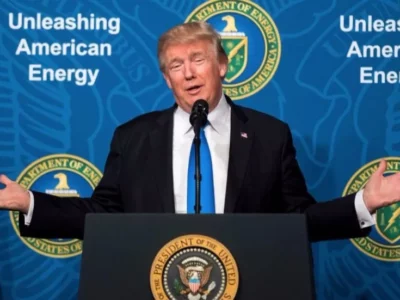We need integrated funding to scale up multibenefit projects
by Marie Grimm, Anna Serra-Llobet, Molly Bruce, and Michael Kiparsky
Climate and ecological challenges are fundamentally linked, demanding solutions that address both environmental and social issues. Multibenefit projects–like levee realignments that reconnect floodplains–can combine climate adaptation, water management and ecosystem restoration efforts. However, most funding programs focus on single-purpose projects, making it difficult to support multibenefit solutions. Our new article studies the Pajaro River flood risk manageme...
CONTINUE READINGExecutive Disorders
One after another, Trump has let loose destructive blasts at the environment to promote fossil fuels, mining, and logging.
We all know that Trump has issued a slew of executive orders since taking the oath of office. We also know that many of these are aimed to promoting fossil fuels, mining, and logging at the expense of the environment, while disfavoring renewable energy. Still, it’s impressive when you put the list together to see the full onslaught. If anything, the list below underplays the extent of the attack on the environment. It doesn’t include attacks on the civil service...
CONTINUE READINGThe Problem is Not Brazil. The Problem is COP
The Drain is a weekly roundup of climate and environmental news from Legal Planet.
“Crazy.” That’s how one young Brazilian described what’s happening in Belém to get ready for COP30, the annual UN climate negotiations which will take place in the Amazon this November. We struck up a brief conversation while I was visiting the Museu Afro Brasil in São Paulo, a museum that chronicles the history and culture of Brazil through art and artifacts with a focus on slavery and the African diaspora. The woman I spoke with was from Belém in th...
CONTINUE READINGGovernors Lead the Fight on Forests and Climate
To see how governors are leading the fight against deforestation, look no further than a meeting happening this week in Brazil.
When the annual U.N. climate conference descends on the small Brazilian rainforest city of Belém in November 2025, it will be tempting to focus on the drama and disunity among major nations. Only 21 countries had even submitted their updated plans for managing climate change by the 2025 deadline required under the Paris Agreement. The U.S. is pulling out of the agreement altogether. Brazilian President Luiz Inácio Lula da Silva, Chinese President Xi Jinping an...
CONTINUE READINGA Midnight Public Land Sale?
Last-minute addition to House reconciliation bill proposes sale or exchange of hundreds of thousands of acres of public lands
There was a last minute amendment added to the House Natural Resources Committee markup on May 6, an amendment which has gotten a lot of negative attention, including from conservative outdoors advocates. The amendment, made by Representative Amodei (Republican, Nevada) and Rep. Maloy (Republican, Utah) would mandate the sale or exchange of at least 449,174 acres of federal public lands in Nevada and Utah. (For a sense of scale, that’s about half of the size of Rhode...
CONTINUE READINGWhy You Should Care That Congress Might Use the CRA to Overturn California Waivers
Here are at least six reasons.
For the first time ever, the U.S. Senate may vote this week to revoke California's authority under the Clean Air Act to cut pollution from cars and trucks. The Senate vote is on a resolution to use the Congressional Review Act to overturn three separate waivers EPA granted California to cut pollutants from cars and trucks. Mary Nichols and I explained previously why using the CRA to revoke the waivers is illegal. You can read our analysis here. Since we wrote that...
CONTINUE READINGTrump’s Self-Defeating NEPA “Reforms”
Rather than streamlining the process, Trump is gumming up the works.
Trump has taken some dramatic steps in the name of improving use of NEPA, the statute governing environmental reviews of projects. The goal is to speed up the permitting process and make it more efficient. The reality is that his efforts will create chaos and uncertainty, with the likely effect of slowing things down. The first Trump action was an effort to completely restructure the way the government implements NEPA. Jimmy Carter empowered a White House office, th...
CONTINUE READINGTrump’s War on Cities
The Administration is devoted to destroying urban life: that puts it with many of history's worst regimes
I just finished up Ian Buruma’s and Avishai Margalit’s excellent book, Occidentalism: The West in the Eyes of Its Enemies, and it struck me that we need to think of Donald Trump’s despoilation of the environment in a broader perspective: his administration seeks to fundamentally change both the natural and the human environment. Trump clearly has declared war on that half of the country that didn’t vote for him, and many of his own devoted followers as well. O...
CONTINUE READINGIs Brazil Ready for COP30? No One Is Ready for COP30
The Drain is a weekly roundup of climate and environmental news from Legal Planet.
It’s officially less than 6 months until COP30 — when tens of thousands of people will descend on the Brazilian city of Belém for the annual UN climate conference — and no one is ready. For one thing, Belém is an impoverished city of 2.5 million that can’t build enough hotels for the 50,000 expected delegates and 150 heads of state that attend Climate Coachella. You may need to book a river boat. More importantly, there is no agreement on how to get ...
CONTINUE READINGNo, DOE, You Can’t Roll Back Product Efficiency Standards
Congress wanted greater energy efficiency over time and banned rollbacks.
The Department of Energy is proposing to rescind key energy efficiency requirements. It is beyond ironic that this is happening at a time when the President has proclaimed an energy emergency. Trump says the grid is struggling desperately to meet surging power demand. That’s a strange time to eliminate regulations that are saving energy. DOE’s action is also illegal, because the law in question has a provision prohibiting rollbacks. DOE is attempting to get ar...
CONTINUE READING










